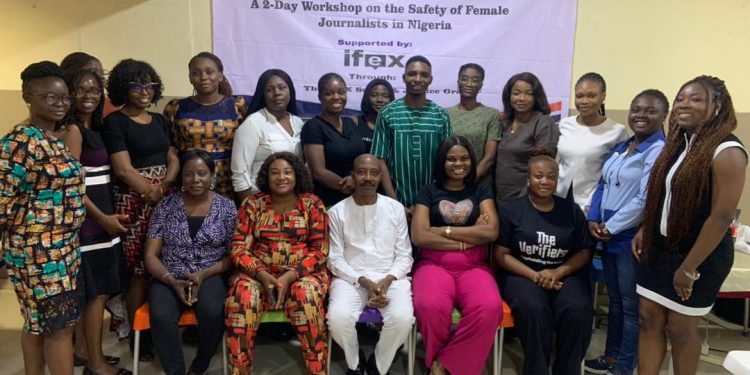Menu
Search
Home Journalism
Stakeholders Call for Legal Reforms, Safety Policies for Nigeria’s Female JournalistsNo ratings yet.
Peace Odekunle by Peace Odekunle August 1, 2025
Stakeholders Call for Legal Reforms, Safety Policies for Nigeria’s Female Journalists
0
SHARES
Media Rights Agenda (MRA) and the International Freedom of Expression Exchange (IFEX), have united to demand urgent legal reforms and robust safety policies to protect Nigeria’s female journalists from escalating gender-specific threats.
Following a two-day capacity-building workshop in Nigeria, media professionals, legal experts, and rights advocates called for stronger laws and newsroom protocols to combat harassment, online abuse, and professional intimidation faced by women in journalism.
Participants unanimously affirmed that the threats female journalists face are systemic and deeply gendered, requiring targeted interventions and coordinated action.
Participants were sensitized on remedies available at national, regional, and international levels, and taught how to identify actions that constitute violations of their rights. The sessions also aimed to demystify redress mechanisms and provide practical tools for safeguarding both physical and digital safety.
The event featured discussions, expert-led sessions on digital safety, and collaborative planning for a safer working environment.
Mr. Ayode Longe, Deputy Executive Director of MRA, highlighted the growing risks female journalists face, including online harassment, sexual threats, and professional intimidation.
“This workshop is part of our efforts to implement the United Nations Plan of Action on the Safety of Journalists, with a focus on the growing and often unaddressed dangers female journalists face in the course of their work,” Longe said.
Day one featured four plenary sessions, including a presentation by Blessing Oladunjoye, publisher of BONews Service, on “Gendered Attacks on Female Journalists in Nigeria: Mapping the Risks” and “Non- Gendered Threats with Potential to Result into Gendered Harm”.
She outlined common threats such as sexual harassment, rape threats, and online abuse including doxxing and malicious use of personal information. These forms of harassment, she said, are often designed to silence women or push them out of the journalism profession.
Oladunjoye noted that female journalists often experience discrimination in story assignments and promotion opportunities, with many confined to “soft” beats such as lifestyle or entertainment. “The professional impact of such marginalization is as severe as the psychological trauma caused by constant online and offline abuse,” she said, stressing that women are frequently targeted simply for being vocal and visible in the public sphere.
Another key plenary session was facilitated by Ayomide Eweje, Programme Officer at MRA, who presented on “Planning for Physical Safety as a Female Journalist” and “Responding to Online Harassment and Ensuring Digital Security.”
Eweje emphasized the importance of pre-assignment risk assessments, emergency planning, and mental health awareness, noting that burnout is a silent but serious hazard in the profession.
Monday Arunsi, legal representative of Media Rights Agenda, introduced participants to legal frameworks that protect the rights and safety of female journalists at national, regional, and international levels..
Arunsi highlighted the Violence Against Persons Prohibition (VAPP) Act among others as a critical piece of Nigerian legislation that criminalizes various forms of violence, including sexual harassment and intimidation, which female journalists often face.
He also referenced the Maputo Protocol officially the Protocol to the African Charter on Human and Peoples’ Rights on the Rights of Women in Africa which mandates state parties to take appropriate measures to eliminate gender-based violence in both public and private spheres.
At the end of the workshop, participants issued a communiqué calling on the Federal and State Governments to publicly condemn all attacks on journalists especially those with gendered implications and to prosecute perpetrators under applicable laws. They also urged lawmakers to review and amend legislation to include explicit protections for women in journalism.
One of the strongest messages from the event was the need to dismantle Nigeria’s entrenched culture of impunity. “Security forces, political actors, media employers, and even colleagues often act with impunity when violating journalists’ rights,” the communiqué noted. “This has normalized abuse and deterred victims from speaking out or seeking justice.”
Stakeholders further called for preventive measures, such as routine safety training and the implementation of anti-harassment policies in newsrooms. Media organizations were specifically advised to adopt gender-sensitive guidelines, provide secure transportation and accommodation for female journalists on high-risk assignments, and create open-door environments for reporting abuse.
The workshop proposed the formation of a national protective network of female journalists to foster peer support and strengthen collective advocacy.
The stakeholders reaffirmed their commitment to protecting the rights and safety of female journalists, urging media owners, regulatory bodies, civil society organizations, and the general public to treat the safety of women in journalism as a national priority.

